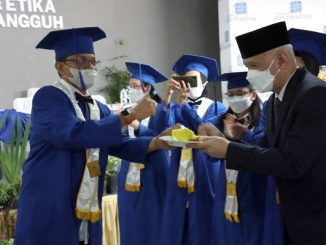
JAKARTA, KalderaNews.com – The issue of equitable access to and governance of space is now a strategic focus at the academic level.
Paramadina University, through the Paramadina Graduate School of Diplomacy, in collaboration with the Indian Space Association (ISpA) and the South ASEAN International Advocacy & Consultancy (SAIAC), held an in-depth public discussion in Jakarta on Friday (November 7, 2025).
The event, titled “Equitable and Access to Space and Satellite,” firmly positioned space as the fifth global strategic domain, alongside land, sea, air, and cyberspace.
RELATED TOPICS:
- ASTRAtech and Goethe-Institut Forge a New Autobahn to Germany for Indonesian Vocational Talent
- UNJ’s Global Reach: Welcoming International Students for Indonesian Cultural Immersion
- Indonesia and European Union Forge Stronger Science and Technology Ties through Horizon Europe
Prof. Dr. Iin Mayasari, Vice Rector for Quality and Cooperation at Paramadina University, opened the discussion by emphasizing that space is no longer a futuristic issue, but a vital foundation for modern life.
“Previously, we only talked about air, land, and sea. Now we recognize the fourth domain—cyberspace—and the true fifth domain, which is space,” Prof. Iin emphasized.
The use of space, from GPS navigation systems to early disaster warnings, is key to national sovereignty and safety. Therefore, Prof. Iin called for collaborative management between government, industry, and academia.
The Importance of Literacy and the Shared Heritage of Humanity
This discussion highlighted two key challenges: unequal access and a lack of public literacy.
Shaanti Shamdasani, President and Chair of SAIAC, emphasized that amidst the massive digital transformation, society needs to recognize its total dependence on satellites and orbital spectrum. She pointed to the unequal access between developed and developing countries as a challenge that must be addressed through fair-based international cooperation.
Meanwhile, Wachid Ridwan, Secretary of the Master of International Relations Program at Paramadina University, reiterated the principles of global governance.
“We must view space as the shared heritage of humanity—the province of all mankind. Fair and collaborative diplomacy is imperative,” Wachid said, emphasizing the role of universities in shaping a generation with ethical principles in space governance.
As Keynote Speaker, Lt. Gen. A.K. Bhatt, Director General of the Indian Space Association (ISpA), outlined India’s successful journey. He said India’s focus has always been simple: how space technology can improve people’s lives, not just reaching other planets.
With a relatively limited budget, India successfully became the chosen country to land a probe on the lunar south pole and is now fostering hundreds of space startups. Bhatt emphasized the importance of collaboration across South and Southeast Asia to ensure that progress in the space economy can be shared.
In response, Prof. Dr. Erna Sri Adiningsih, Executive Director of the Indonesian Space Agency (INASA) – BRIN, explained the direction of Indonesia’s national space policy. The main focus currently is space debris management and improving space situational awareness.
“Human activity in space is increasingly intense. Sustainable access to space is a shared responsibility,” concluded Prof. Erna, emphasizing the need for Indonesia to play an active role in global diplomacy to maintain space accessibility in the future.
Cek Berita dan Artikel KalderaNews.com lainnya di Google News
*Jika merasa artikel ini bermanfaat, silakan dishare pada saudara, sahabat dan teman-temanmu. Tertarik menjalin kerjasama dengan KalderaNews.com? Silakan hubungi WA (0812 8027 7190) atau email: kalderanews@gmail.com.





Leave a Reply